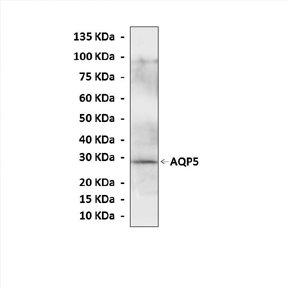Product Sheet CA1230
Description
BACKGROUND Aquaporins (AQPs) are membrane water channels that play critical roles in controlling the water contents of cells. These channels are widely distributed in all kingdoms of life, including bacteria, plants, and mammals. More than ten different aquaporins have been found in human body, and several diseases, such as congenital cataracts and nephrogenic diabetes insipidus, are connected to the impaired function of these channels. They form tetramers in the cell membrane, and facilitate the transport of water and, in some cases, other small solutes across the membrane. However, the water pores are completely impermeable to charged species, such as protons, a remarkable property that is critical for the conservation of membrane\'s electrochemical potential, but paradoxical at the same time, since protons can usually be transferred readily through water molecules. Water molecules passing the channel are forced, by the protein\'s electrostatic forces, to flip at the center of the channel, thereby breaking the alternative donor-acceptor arrangement that is necessary for proton translocation.1
Aquaporin-5 (AQP5), an apical plasma membrane (APM) water channel in salivary glands, lacrimal glands, and airway epithelium, has an important role in fluid secretion and confers high osmotic water permeability. The activation of M3 muscarinic acetylcholine receptors (mAChRs) or alpha1-adrenoceptors on the salivary glands induces salivary fluid secretion. AQP5 localizes in lipid rafts and activation of the M3 mAChRs or alpha1-adrenoceptors induced its translocation together with the lipid rafts to the APM in the interlobular ducts of rat parotid glands.2 AQP5 is also expressed in lung cancer tissue. It was shown that there was an up-regulation of AQP5 expression in cancer tissue compared to surrounding normal tissue. In addition, expression of AQP5 in lung cancer tissue was associated with poor prognosis. Moreover, Studies demonstrated that AQP5-facilitated lung cancer cell proliferation and migration, possibly through activation of the EGFR/ERK/p38 MAPK signaling pathway.3
Aquaporin-5 (AQP5), an apical plasma membrane (APM) water channel in salivary glands, lacrimal glands, and airway epithelium, has an important role in fluid secretion and confers high osmotic water permeability. The activation of M3 muscarinic acetylcholine receptors (mAChRs) or alpha1-adrenoceptors on the salivary glands induces salivary fluid secretion. AQP5 localizes in lipid rafts and activation of the M3 mAChRs or alpha1-adrenoceptors induced its translocation together with the lipid rafts to the APM in the interlobular ducts of rat parotid glands.2 AQP5 is also expressed in lung cancer tissue. It was shown that there was an up-regulation of AQP5 expression in cancer tissue compared to surrounding normal tissue. In addition, expression of AQP5 in lung cancer tissue was associated with poor prognosis. Moreover, Studies demonstrated that AQP5-facilitated lung cancer cell proliferation and migration, possibly through activation of the EGFR/ERK/p38 MAPK signaling pathway.3
REFERENCES
1. Jensen, M. Ø. Et al: Structure 9:1083-1093, 2001
2. Ishikawa, Y. et al: Biochim. Biophys. Acta 1758:1053-60, 2006
3. Zhang, Z. et al: J Pathol. 221:210-20, 2010
2. Ishikawa, Y. et al: Biochim. Biophys. Acta 1758:1053-60, 2006
3. Zhang, Z. et al: J Pathol. 221:210-20, 2010
Products are for research use only. They are not intended for human, animal, or diagnostic applications.
Details
Cat.No.: | CA1230 |
Antigen: | Short peptide from human AQP5 sequence. |
Isotype: | Rabbit IgG |
Species & predicted species cross- reactivity ( ): | Human, Mouse, Rat |
Applications & Suggested starting dilutions:* | WB 1:1000 IP n/d IHC n/d ICC n/d FACS n/d |
Predicted Molecular Weight of protein: | 29 kDa |
Specificity/Sensitivity: | Detects endogenous levels of AQP5 proteins without cross-reactivity with other related proteins. |
Storage: | Store at -20°C, 4°C for frequent use. Avoid repeated freeze-thaw cycles. |
*Optimal working dilutions must be determined by end user.
Products
| Product | Size | CAT.# | Price | Quantity |
|---|---|---|---|---|
| Rabbit Aquaporin 5 Antibody: Rabbit Aquaporin 5 Antibody | Size: 100 ul | CAT.#: CA1230 | Price: $375.00 |

